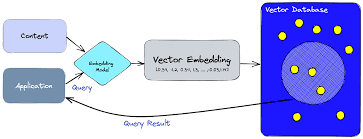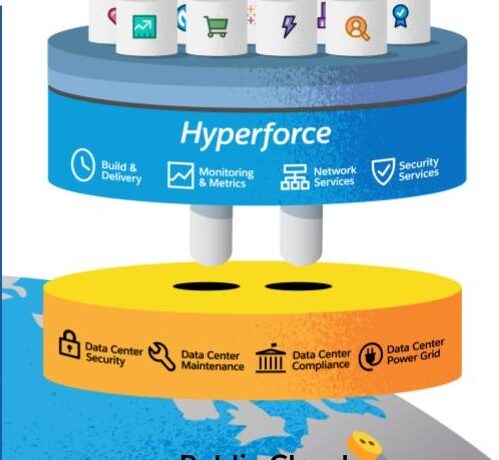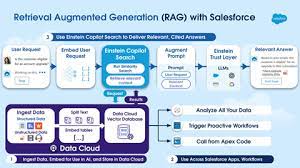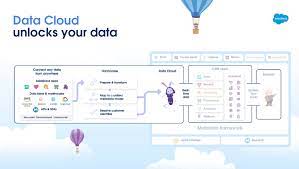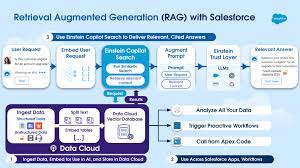Agentforce AI Transforming the Workplace
AI is Transforming the WorkplaceArtificial intelligence is revolutionizing how businesses operate. By driving productivity, efficiency, and scalability, AI agents are unlocking new possibilities in the modern business landscape. However, achieving AI’s full potential requires navigating a complex web of data sources, workflows, and legacy systems. Enter Agentforce, a complete AI system for enterprises unveiled at Dreamforce. This agentic platform integrates data, automation, and human collaboration into a unified solution, enabling organizations to scale autonomous AI agents across their operations using low-code tools. Here are five key takeaways from Dreamforce to help organizations leverage AI agents to transform business operations and software development. 1. An Agentic Platform is Crucial for Building Exceptional AI Agents “What we build and how we build it is changing dramatically in this world of AI.”— Alice Steinglass, Executive Vice President and General Manager, Salesforce Platform CEOs are increasingly prioritizing AI, recognizing its potential to solve complex problems and enhance experiences for employees, partners, and customers. However, many teams face significant challenges in meeting AI demands safely and effectively. Issues such as disconnected data, IT backlogs, tech debt, and limited resources create a gap between AI ambition and execution. Agentforce addresses these challenges by providing an integrated platform that connects data, AI, automation, and humans. During the Platform keynote, a live demo showcased how an Agentforce agent streamlined casting for a fictional sports reality TV show, “Hooping with the Stars.” The agent seamlessly integrated audition videos, casting data, and applicant details, enabling faster, more informed decisions. This demo highlighted the potential of an agentic platform to turn challenges into opportunities, empowering organizations to build secure, dynamic AI agents. 2. Low-Code Tools Make AI Agents Accessible to Everyone “The true value is about getting work done. Agents being able to take action is what empowers employees and drives customer success.”— Claire Cheng, Vice President of Software Engineering AI agents surpass traditional chatbots by not only answering questions but also making decisions and taking actions. This capability is transforming customer and employee experiences by eliminating repetitive tasks and enabling teams to focus on higher-value activities. For example, Wiley, a global leader in education and research, deployed Agentforce agents to handle routine inquiries. Within weeks, these agents improved case resolution rates by over 40%, outperforming the company’s previous chatbot solution. Despite their sophistication, Agentforce agents are easy to build. With no-code and low-code tools like Agent Builder and Prompt Builder, businesses can create agents tailored to their unique needs, enabling even non-technical users to innovate without technical headaches. 3. Unified Data Enhances Accuracy and Intelligence of AI Agents “By analyzing unstructured data, you can uncover deeper patterns and sentiments that structured data alone might miss, leading to better personalization and decision-making.”— Taraneh Whitefield, Senior Director, Product Marketing Data is the foundation of effective AI strategies. Salesforce’s Data Cloud has become a leader in addressing data challenges by eliminating silos and simplifying data integration. This year’s introduction of the Data Cloud Vector Database marked a significant milestone. The platform now enables the integration of unstructured data — such as PDFs, videos, and audio files — alongside structured data, offering a complete 360-degree view of customers. For example, Mascoma Bank leveraged Data Cloud to consolidate data from 66 legacy systems. This streamlined sales workflows and improved personalized recommendations, reducing manual data handling by 45 minutes per loan application. 4. API-Led Integration is Essential for Scalable AI Systems “The world of AI is truly the world of APIs.”— Param Kahlon, EVP/GM, Automation & Integration, Salesforce The success of AI depends on seamless integration. Organizations often manage hundreds of applications with unique update schedules and security requirements, making integration a critical challenge. MuleSoft’s API-led approach provides a solution, allowing organizations to unlock data from disparate systems. With the introduction of MuleSoft Topic Center, developers can now package APIs and metadata into actionable “Topics” for Agentforce agents. This innovation simplifies building agents that can interact with enterprise systems, as demonstrated in a live demo featuring Aston Martin’s VIP vehicle customization experience. 5. Better Decision-Making Depends on Empowering People with the Right Data “I’m free to focus on the things that really, really matter to me.”— Anya A’Hearn, Hall of Fame Tableau Visionary Efficient decision-making relies on fast access to actionable insights. Tools like Tableau Einstein, Tableau Pulse, and Tableau Agent empower users to interact with data through natural language queries. For instance, with Tableau Agent, users can ask questions in plain language, and the agent will create visualizations instantly. Tasks that once took hours now take minutes, freeing up time for more strategic decision-making. Empowering Autonomous Agents with Data, AI, and Automation The future of AI is here, and it hinges on the seamless integration of data, automation, and human expertise. Agentforce, alongside Salesforce Platform, Data Cloud, MuleSoft, and Tableau, is equipping organizations with the tools to harness AI’s full potential — whether it’s 24/7 customer service, automated workflows, or real-time data visualization. Discover how Agentforce can revolutionize your business today. Like Related Posts Salesforce OEM AppExchange Expanding its reach beyond CRM, Salesforce.com has launched a new service called AppExchange OEM Edition, aimed at non-CRM service providers. Read more The Salesforce Story In Marc Benioff’s own words How did salesforce.com grow from a start up in a rented apartment into the world’s Read more Salesforce Jigsaw Salesforce.com, a prominent figure in cloud computing, has finalized a deal to acquire Jigsaw, a wiki-style business contact database, for Read more Service Cloud with AI-Driven Intelligence Salesforce Enhances Service Cloud with AI-Driven Intelligence Engine Data science and analytics are rapidly becoming standard features in enterprise applications, Read more


